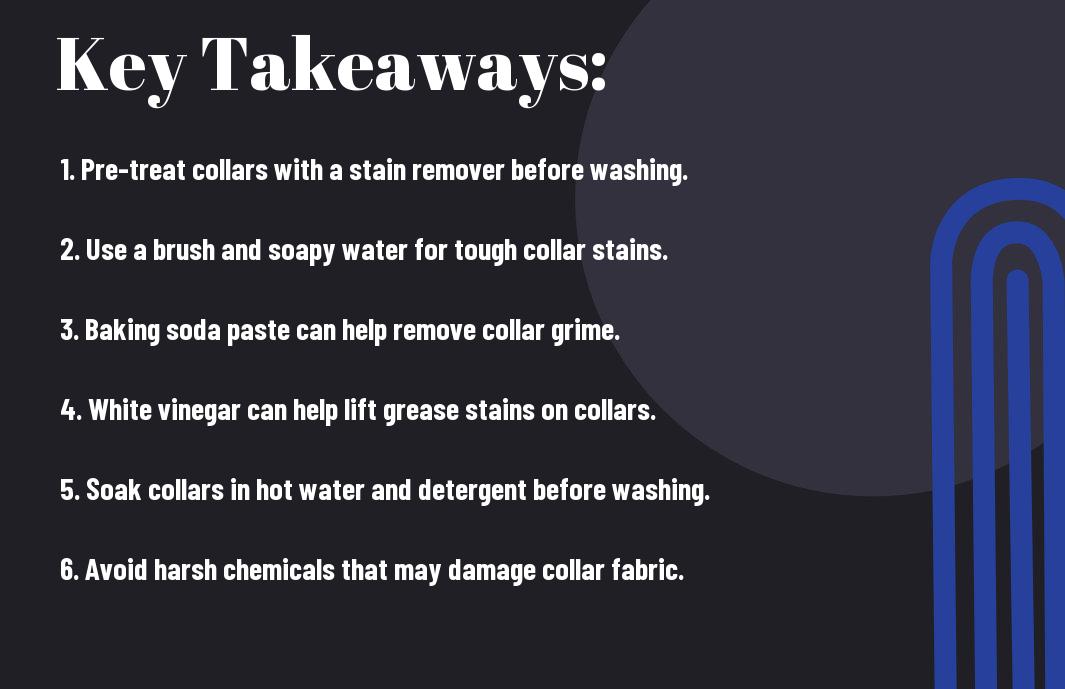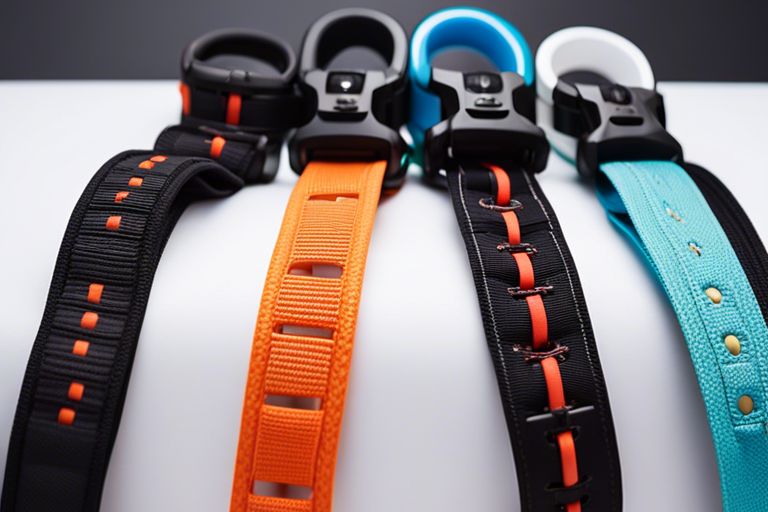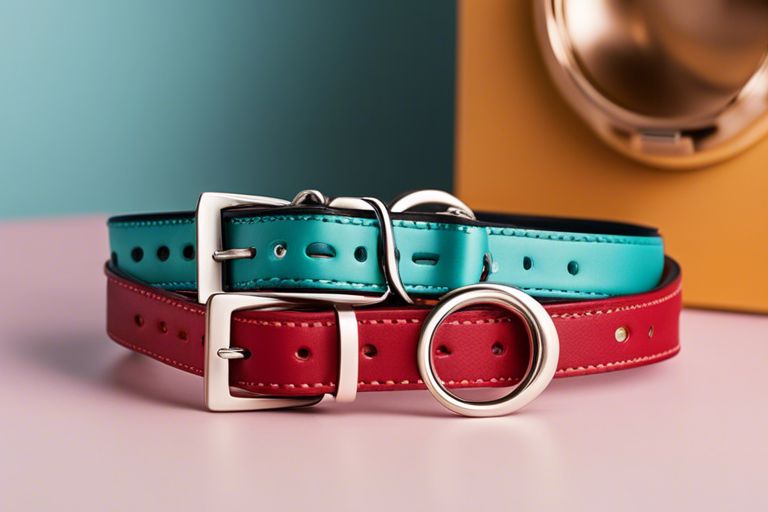Over time, collars on shirts can accumulate dirt, sweat, and oils, leading to unsightly stains and odors. It is necessary to have the right cleaner to effectively remove grime without damaging the fabric. Choosing the best collar cleaner can prolong the life of your favorite clothes while keeping them looking fresh and clean. In this blog post, we will explore different types of cleaners and provide recommendations for the most effective products to keep your collars looking spotless.
Key Takeaways:
- Identify the fabric: Before selecting a cleaner, it is crucial to identify the fabric of the collar to choose the most suitable product.
- Spot test: Always perform a spot test on a small, inconspicuous area of the collar to ensure the cleaner does not cause any damage or discoloration.
- Consider specialized cleaners: For tough stains or delicate fabrics, consider using specialized cleaners designed specifically for collars.
- Use a gentle approach: Opt for mild cleaners and gentle cleaning methods to prevent damage to the collar’s fabric or structure.
- Follow care instructions: Always refer to the garment care label for specific instructions on how to clean the collar properly.

Types of Collar Stains
Little imperfections on our collars can be a real nuisance when it comes to keeping our clothes looking fresh and clean. Collar stains can vary in origin and intensity, requiring different cleaning methods to effectively remove them. Understanding the types of stains you’re dealing with can help you choose the best cleaner for the job.
| Stain Type | Description |
| Sweat and Body Oils | Caused by sweat and natural body oils that can build up on the collar over time. |
| Makeup and Other External Stains | Includes stains from makeup, food, beverages, and other external sources that come into contact with the collar. |
Sweat and Body Oils
Collar stains caused by sweat and body oils are common and can be challenging to remove. These stains often appear as yellowish or dark marks on the collar, particularly in white or light-colored shirts. To tackle this type of stain, pre-treating the collar with a best way to clean shirt collars : r/laundry stain remover before laundering can be effective.
Makeup and Other External Stains
Other sources of collar stains include makeup, food, beverages, and other external factors that can leave unsightly marks on your clothing. These stains may require more targeted treatment based on the specific substance causing the discoloration. Using a specialized cleaner or spot treatment can help to effectively remove these stains without damaging the fabric. Plus, prompt action is key to preventing the stain from setting and becoming more difficult to remove.
Knowing the origin of the collar stain is crucial in determining the most appropriate cleaning method and products to use for optimal results.
Choosing the Best Collar Cleaner
Criteria for Selection
For most effective collar cleaning, it is vital to consider the fabric of the collar, the type of stains or dirt to be removed, and any skin sensitivities or allergies the wearer may have. Look for a cleaner that is gentle on fabrics yet tough on stains to ensure the longevity of your collars.
Comparative Analysis of Different Cleaners
One way to choose the best collar cleaner is to conduct a comparative analysis of the different products available in the market. Consider factors such as price, effectiveness in stain removal, compatibility with different fabrics, and ease of use. This information can be neatly organized in a table for easy comparison.
Analysis:
| Criteria | Importance |
|---|---|
| Price | Important |
| Effectiveness | Dangerous |
| Fabric Compatibility | Positive |
| Ease of Use | Important |

Application Techniques
Pre-Treatment Advice
Many collar stains can be tough to remove, so it’s important to properly pre-treat the area before washing. To effectively pre-treat a collar, apply a small amount of a pre-treatment cleaner directly onto the stained area. Allow it to sit for 5-10 minutes to penetrate the fabric and break down the dirt and grime.
Step-by-Step Cleaning Guide
As far as cleaning collars, following a step-by-step guide can ensure the best results. Here is a simple and effective cleaning guide to help you tackle collar stains:
Application
| Step | Instructions |
| 1 | Gently scrub the pre-treated collar with a soft-bristled brush to help lift the stain. |
| 2 | Place the collar in a delicates bag to protect it during the washing machine cycle. |
| 3 | Wash the collar on a gentle cycle with a mild detergent specifically formulated for stains. |
| 4 | Air dry the collar or hang it up to prevent shrinking in the dryer. |
Plus
Remember to always spot test any cleaner or pre-treatment product on a small, inconspicuous area of the collar before applying it to the stained area. This will help ensure that the cleaner does not damage or discolor the fabric. Additionally, always read and follow the care label instructions on the garment to prevent any damage during the cleaning process.

Maintenance and Prevention
Unlike other parts of your shirt, collars are prone to getting dirty more quickly due to their proximity to the neck. Sweat, skin oils, and dirt can easily build up, leading to unsightly stains. To learn more about how to remove stubborn collar stains, check out Ring Around the Collar | How to Remove It From Your Shirt.
Routine Care for Collars
Collars should be treated with care to maintain their cleanliness and shape. After each wear, it’s recommended to gently spot clean any areas with visible dirt or stains. For a more thorough cleaning, machine or hand wash the shirt according to the care instructions provided by the manufacturer.
Tips to Avoid Collar Stains
An imperative part of collar maintenance is preventing stains in the first place. To avoid collar stains, consider the following tips:
- Regular cleaning: Launder your shirts regularly to prevent dirt and oil buildup on the collar.
- Proper storage: Hang your shirts properly to maintain the collar’s shape and prevent creasing.
- Use a collar stay: Insert a collar stay to keep the collar crisp and prevent it from curling.
The key to keeping your collars looking fresh and stain-free is to adopt these preventive measures consistently.
To wrap up
Presently, the best cleaner for collars would be a pre-treating solution or stain remover specifically designed for tough stains on clothing. These products are effective in breaking down and lifting dirt, oils, and grime from fabric fibers, making them ideal for targeting the soiled areas on collars. Remember to always follow the instructions on the product label and test a small, inconspicuous area of the collar before applying the cleaner to ensure compatibility with the fabric. With the right cleaner and proper care, you can keep your collars looking clean and fresh for longer.
FAQ
Q: What is the best cleaner for collars?
A: The best cleaner for collars is a mixture of mild detergent and warm water. Avoid using harsh chemicals or bleach as they can damage the fabric.
Q: How should I clean a collar without ruining it?
A: To clean a collar without ruining it, gently spot treat any stains with a mild detergent, then wash the collar by hand in warm water. Avoid scrubbing vigorously or using hot water.
Q: Can I use a washing machine to clean collars?
A: It is not recommended to clean collars in a washing machine, as the agitators and spinning motion can cause the collar to lose its shape or fray. Hand washing is the safest method for cleaning collars.
Q: How often should I clean collars?
A: Collars should be cleaned regularly, especially if they come into contact with sweat, oils, or dirt. A general rule of thumb is to clean collars every 1-2 weeks, or more frequently if needed.
Q: Are there any special tips for cleaning white collars?
A: For white collars, you can add a small amount of baking soda to the cleaning mixture to help brighten and whiten the fabric. Additionally, allowing the collar to soak in the cleaning solution for a few minutes before rinsing can help lift stubborn stains.
